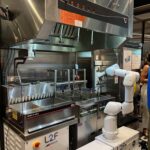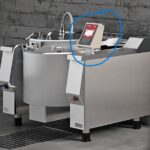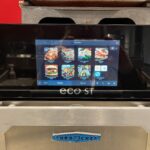
Transforming Healthcare Foodservice: The Power of AI and Robotics
Posted on April 10th, 2024
✔ Enhanced Efficiency and Accuracy:
AI and smart equipment/robotics streamline various food service processes, reducing manual errors and saving valuable time. Automated systems can be used for inventory management, ensuring that the right ingredients are always available while minimizing waste. Intelligent algorithms can analyze patient preferences and dietary restrictions, allowing for personalized meal planning and ensuring that each meal is catered to the individual’s specific needs. Producing a recipe can be more consistent and accurate by ingredient needs and programing directly incorporated into the equipment. By automating repetitive tasks, such as meal preparation and delivery, hospitals can better utilize their workforce free up their staff to focus the food experience, consistency for patient care, resulting in improved efficiency throughout the foodservice workflow.
✔ Improved Patient Satisfaction:
Food plays a vital role in the overall patient’s experience during their hospital stay. By leveraging AI and smart equipment/robotics, hospitals can offer a more patient-centric approach to foodservice. These technologies enable personalized menus based on patients’ medical conditions, allergies, and cultural preferences. Meal selection can be done through interactive interfaces, giving patients more control over their dietary choices. AI-powered chatbots can assist patients in accessing nutritional information, answering questions, and addressing concerns promptly. Ultimately, this enhanced patient experience leads to higher satisfaction rates and improved health outcomes.
✔ Enhanced Safety and Compliance:
Food safety is of paramount importance in healthcare settings. AI and smart equipment/robotics can play a crucial role in ensuring compliance with stringent regulations and minimizing the risk of foodborne illnesses. Intelligent monitoring systems equipped with sensors can continuously monitor critical parameters such as temperature and humidity in food storage and preparation areas, alerting staff to any deviations. Smart equipment/Robotics can assist in the preparation and handling of food, minimizing the risk of contamination and human errors. By implementing these technologies, hospitals can maintain the highest standards of food safety and compliance, safeguarding the well-being of patients and staff.
✔ Data-Driven Decision Making:
AI and smart equipment/robotics generate vast amounts of data related to food consumption patterns, inventory management, and operational efficiency. This data can be analyzed and leveraged to make data-driven decisions, optimize food service processes, and identify areas for improvement. By gaining insights into patient preferences healthcare organizations can refine their menus, ensure optimal nutrition, and reduce food waste. Predictive analytics can be employed to anticipate demand and adjust inventory levels, accordingly, avoiding shortages or excesses. These technologies empower healthcare foodservice providers with actionable intelligence, enabling continuous improvement and informed decision-making.
The integration of AI and smart equipment/robotics into healthcare foodservice operations will revolutionize the way hospitals cater to their patients’ nutritional needs. By leveraging these technologies, hospitals can enhance efficiency, improve patient satisfaction, ensure compliance, and make data-driven decisions. As the healthcare industry continues to embrace digital transformation, it is crucial for foodservice providers to harness the power of AI and smart equipment/robotics to stay at the forefront of innovation and deliver the best possible foodservice experience. The future of healthcare foodservice is undoubtedly intertwined with these transformative technologies, promising a healthier and more satisfying journey for patients and healthcare providers alike. As we move into this next generation of technology, we need to be smart and strategic in how we utilize it. Let’s be proactive and manage this process before AI manages us.
RSA is ready to help you with these opportunities and challenges.





